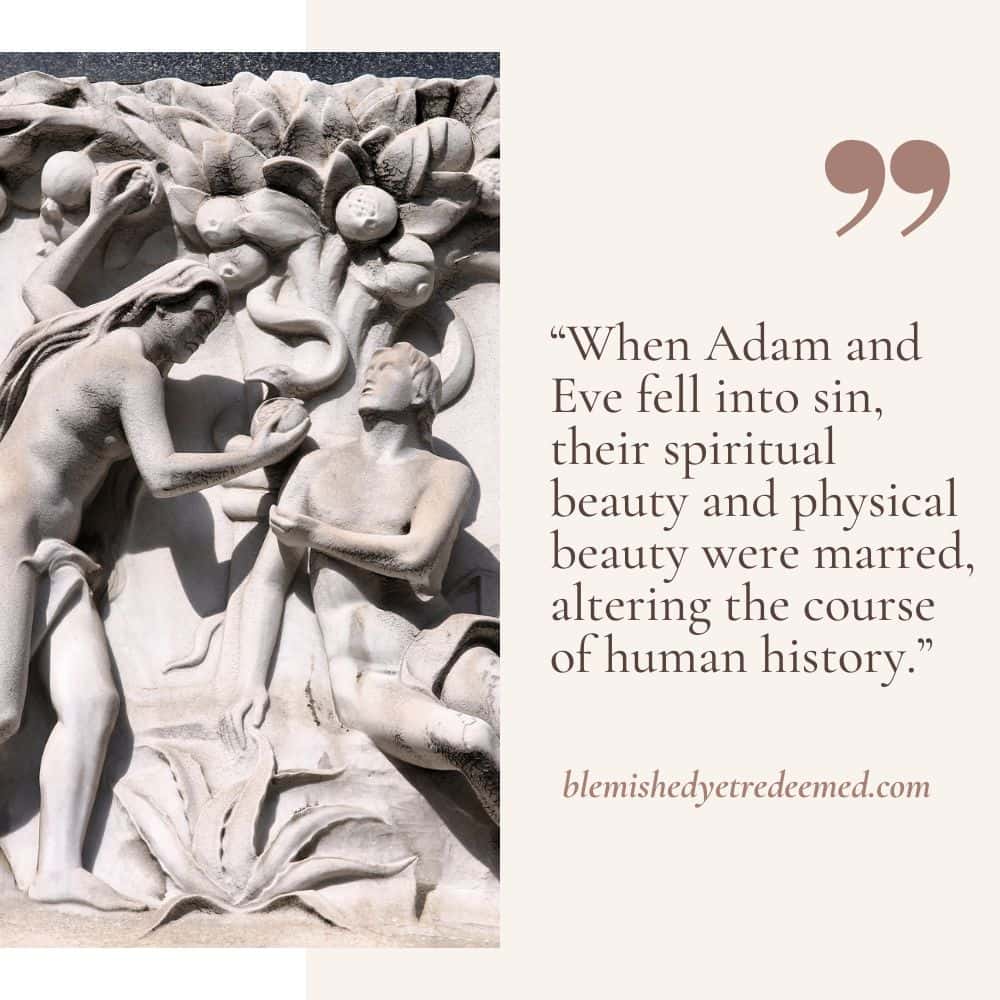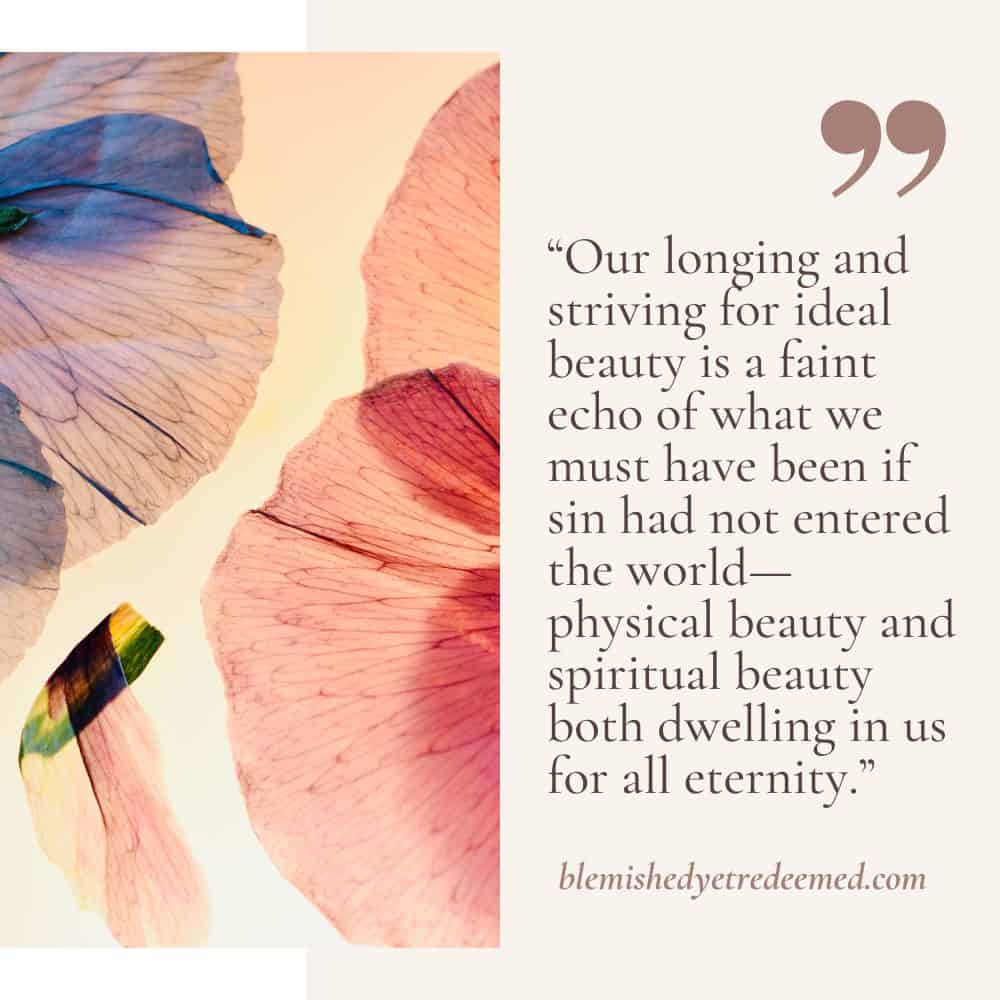What Does the Bible Say About Acne and Body Image Issues?

What does the Bible say about beauty and appearance?
Whenever this question is asked, Christians would say outward appearance does not matter. What God values most is a woman’s inner beauty: an “incorruptible beauty of a gentle and quiet spirit” (1 Pet. 3:3-4).
To be bluntly honest, I long for physical beauty. I have been breaking out since I was 15. I would honestly feel so much better if I never had to deal with acne, scars, and dark spots–if I would have that enviable clear skin.
Women who look outwardly simple and unassuming, to my surprise, still have closets brimming with clothes, bathroom shelves stocked with cosmetic products, and concerns about their skin, aging, and weight.
A quick Google search will reveal women do have theological and existential questions regarding beauty: Why did God make me ugly? Why did God make others beautiful? If God loves me, why am I ugly? What does the Bible say about acne and body image issues?
Almost all women understand that inner character holds more value than outward appearance. Yet, as I closely observe myself and other women, I see this tension, this aspiration to look beautiful.
Perhaps, we must not simply dismiss physical beauty.
Rather, we should delve into the Scriptures to understand where this longing for beauty comes from—so we can discover what resolves this desire that has disquieted women throughout history.
Eve and the Fall of Her Beauty
Eve, the first woman, was so beautiful—gloriously beautiful. God made Eve with His very own hands. God clothed Eve with His own glory.
Eve possessed both spiritual beauty and physical beauty. She was not merely one or the other. She had both as she was made in the image of God.
God walked side by side with her in the cool of the day with Adam. Her existence was paradise.
But Satan, disguised as a serpent, provoked Eve to doubt: “Did God actually say, ‘You shall not eat of any tree in the garden’?”
“We may eat of the fruit of the trees in the garden, but God said, ‘You shall not eat of the fruit of the tree that is in the midst of the garden, neither shall you touch it, lest you die,’” Eve responded.
“Gotcha!” the serpent thought. “Eve does not know this tree is named the tree of the knowledge of good and evil. She even added to God’s commandment. She will not die by touching the fruit. She will die only if she eats it. Adam did a poor job of teaching her.”

The serpent inched close to Eve: “You will not surely die. For God knows that when you eat of it your eyes will be opened, and you will be like God, knowing good and evil.”
Eve’s eyes sparkled at the thought of being like God, of being as wise as her Creator. She believed it was a good thing to aspire.
She plucked the fruit and ate it. She gave the fruit to her husband. Eve was deceived, but Adam knew it was disobedience. (1 Tim. 2:14)
Still, Adam ate the fruit.
The serpent smirked as Eve, the weakest link, became the temptress for Adam.
Then the eyes of both were opened, and they knew that they were naked.
When Adam and Eve fell into sin, their spiritual beauty and physical beauty were marred, altering the course of human history.
And they sewed fig leaves together and made themselves loincloths.
Eve stood still as the divine glory that had once enveloped her slipped away. She turned to mere fig leaves, desperate to shield herself from the shame and guilt she had never known before.
Before the Fall, Eve’s source of beauty was God Himself. But when she sinned, she had to rely on herself to cover and fix her nakedness.
She had to hide with Adam “from the presence of the LORD God among trees of the garden.” She knew she was no longer the creation that God had called “very good.”
And the LORD God made for Adam and for his wife garments of skins and clothed them.
Before banishing the couple from the garden of Eden, God killed an animal to provide them with garments. Adam and Eve witnessed the first physical death in creation.
Although they did not lose their breath like the animal, Adam and Eve knew they died within—spiritually. They no longer had the life and beauty of God in them.
The relationship was fractured. They sensed they no longer loved God as before.
The love for self and the newfound knowledge of rebellion—knowing both good and evil, not in holiness, but in opposition to the Creator—was now their desire and pursuit.
But on the very day they sinned God promised:
“I will put enmity between you [serpent] and the woman [Eve],
and between your offspring and her offspring;
he shall bruise your head,
and you shall bruise his heel.”
An offspring of hers would crush the head of the serpent that tempted her to disobey God.
Eve shall be redeemed and shall know again the beauty she lost.
Women’s Struggle With Covering and Fixing Flaws
Thousands of years have passed and yet the daughters of Eve still carry within them the echoes of her longing and her sorrow: We have always felt our bodies need covering and fixing.
It may be your weight, body shape, wrinkles, or facial features. For me, it’s my skin issue—acne.
Although acne was a bridge for me to repent and believe the gospel, it also turned out as a barrier to my Christian walk.

Of all the places I thought I wouldn’t be laughed at for breaking out, it happened in church.
That moment, I faced an unpleasant reality: Even though people who profess Christ claim to hold inner beauty in higher esteem, outer beauty still allures and influences their perceptions and actions.
And I was punished—mocked with a coarse joke—because my acne was unsightly to their eyes.
That incident triggered distorted thoughts about my appearance, trapping me in a relentless loop.
I lived in fear of not measuring up to beauty standards. I lived as if the pursuit of clear skin was my ultimate goal. I lived with this silent grumbling that God didn’t create me like those other girls who never had to worry about breaking out. I lived covering and fixing myself with mere fig leaves.
But the greatest tragedy was I lived unaware that the gospel of Christ had already provided the solution to my longing and pursuit of beauty.
Christ Restores Our Disfigured Beauty
What if we trace our longing for beauty—and the root of beauty problems—back to the Fall?
Because of the Fall, we inherited a distorted imago Dei from Adam and Eve. Although the image of God in us is not lost, we no longer reflect the fullness of God’s glory, both spiritually and physically.

While some may possess a gentle character, their hearts are still bent to sin just to satisfy the self.
While some may possess good looks, their attractiveness is doomed from the beginning—decay and disease and death will consume it.
Women who are neither notable for character nor looks still strive to at least fit in. But so soon we discover it is an exhausting game. Yet, we carry on because this is how we gain our worth, identity, and approval.
Can our endless activity of covering and fixing our flaws mean we long for redemption, a restoration of the imago Dei within us?
We know deep in our hearts, when we are alone in the room examining our bodies and our lives, that things are not right—we are supposed to look beautiful inside out.
However, our sin nature has given us a very shallow language to describe our longing for the restoration of the image of God in us.
I need to lose more weight.
I need to clear my skin.
I need to become the best version of myself.
I need to change this…and this…and that…
And the world system, saturated with half-truths, capitalizes on our insecurities to sell us “life-changing miracles” and deceive us once again.
You need this diet to lose weight fast.
You need these products to achieve clear skin.
You need this course to level up as a woman.
You need this to change this…and this…and that…
Like Eve, we take a bite from their fruit because we think it’s the wise and pleasant thing to do.
Our longing and striving for ideal beauty is a faint echo of what we must have been if sin had not entered the world—physical beauty and spiritual beauty both dwelling in us for all eternity.
In our original state, we would have reflected God’s glory: The divine beauty and goodness of God would be dwelling in us.
Our solution, however, is to fit into standards—either molding ourselves into the beauty standards set by society or the ones we set for ourselves. But whichever standards we choose, they are all crafted out of our dimmed knowledge of good and evil.
That’s why in the end, we often pretend we feel good. Even if it does work, it’s fleeting—and we find ourselves chasing that high again.

But God’s answer for the beauty we long so much is Christ Himself.
When sin disfigured our imago Dei, Christ took the punishment we deserved.
See, my servant will act wisely;
He will be raised and lifted up and highly exalted.
Just as there were many who were appalled at Him—
His appearance was so disfigured beyond that of any human being
and His form marred beyond human likeness—
so He will sprinkle many nations,
and kings will shut their mouths because of Him.
Isaiah 52:13-15, NIV
Christ was disfigured so anyone who repents (turns away from sin) and believes the gospel (the good news of salvation through Christ) will be made whole again—the restoration of the disfigured imago Dei (Col. 3:10).
This desire and pursuit for beauty is not rooted in social and cultural expectations, but it stems from a longing to return to God’s original design for us—and ultimately the yearning to experience God’s perfect beauty once more, like when Adam and Eve beheld God’s glory when they walked with Him in the cool of the day.
This is why all of humanity’s hunger for beauty echoes our original design to worship and commune with the all-beautiful God.

How Christ Makes Us Beautiful
Through Christ, women discover true beauty—both inward and outward. They learn that their beauty is not a weapon but a gift to be used to worship God.
We all know how we have weaponized beauty. We have the tendency to use external adornment to attract people’s attention, create feelings of insecurity in others, elevate ourselves in pride and arrogance, and achieve selfish ends.
Although that is women’s tendency, the Apostles Peter and Paul did not forbid Christian women from adorning themselves.
Do not let your adornment be merely outward—arranging the hair, wearing gold, or putting on fine apparel— rather let it be the hidden person of the heart, with the incorruptible beauty of a gentle and quiet spirit, which is very precious in the sight of God.
1 Peter 3:3-4, NKJV
…in like manner also, that the women adorn themselves in modest apparel, with propriety and moderation, not with braided hair or gold or pearls or costly clothing, but, which is proper for women professing godliness, with good works
1 Timothy 2:9-10, NKJV
Instead, these Bible verses about outward appearance mean that a Christian woman has to use outward adornment appropriate for worship and for expressing her new identity in Christ: She is a new creation.
A godly woman neither self-deprecates nor self-promotes. Instead, she uses her outward adornment to complement what’s inside of her: the incorruptible beauty of a gentle and quiet spirit.
A godly woman’s choice of clothing, hairstyle, and accessories is not to conform to worldly beauty standards but to honor and worship her Creator, who has fearfully and wonderfully made her.
A godly woman who does things that may improve her appearance as an outcome does not do so just for vanity, but to honor her body—a vessel given by her Creator so she can carry out good works (1 Tim. 2:10).
Yet, if necessary, she is ready to give up her adornments so she can serve better in challenging environments. But she is also ready to pick them up again to celebrate the godly woman that she is (Prov. 31:22).

Because as a godly woman, beauty is no longer a weapon she wields, an idol she serves, and an instrument through which others idolize her.
This is how a woman is made beautiful inside out through Christ—and this is only the foretaste.
But a foretaste of beauty is not meant to satiate hunger. Instead, this foretaste of beauty awakens a deeper desire.
We grow weary in our present bodies, and we long to put on our heavenly bodies like new clothing. For we will put on heavenly bodies; we will not be spirits without bodies. While we live in these earthly bodies, we groan and sigh, but it’s not that we want to die and get rid of these bodies that clothe us. Rather, we want to put on our new bodies so that these dying bodies will be swallowed up by life. God Himself has prepared us for this, and as a guarantee He has given us His Holy Spirit.
2 Corinthians 5:2-5, NLT
We continue to yearn because we await the full realization of beauty in its complete form.
When Christ comes, we shall be like Him because we shall see Him as He is. (1 John 3:2)
Knowing this truth and promise will help us to put our desire and pursuit of beauty in a proper perspective—we adorn ourselves inside and out in anticipation of Christ’s return.
What does the Bible say about acne and body image issues, as well as all other beauty-related concerns? They must not discourage and fret us—they must point us to Christ who is the resurrection and the life (John 11:25). Through resurrection, we will experience a complete vision of beauty: God will unite physical beauty and spiritual beauty in our glorified bodies, and we will behold Him in all His beauty and splendor.
Eternity in God’s presence will wipe out any remembrance and trace of imperfections and insecurities.
There will be no covering or fixing of flaws.


